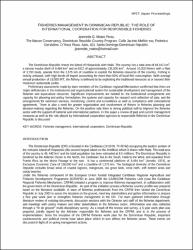/admin/item?itemID=3482a883-3c92-4a93-89e2-0f40919d54c4
Fisheries management in Dominican Republic : the role of international cooperation for responsible fisheries

View/
Type of Access
OpenMaterial Type
Conference materialType of Content
Scientific researchSubject
Gestión ambiental - Políticas y normasRecursos naturales - República Dominicana
Pesca sostenible
Language
EnglishCollection
- Investigación ambiental [1698]
Metadata
Show full item record| Abstract: | The Dominican Republic shares the island of Hispaniola with Haiti. The country has a total area of 48,442 km², a narrow insular shelf of 9,484 km² and an EEZ of approximately 238,000 km². Around 10,000 fishers with a fleet of 3,750 boats, operate from the 1,575 km of coastline to exploit the fisheries resources of the country. Fisheries is mainly artisanal, with high levels of import accounting for more than 50% of local fish consumption. With average annual production of 13,000 MT, the fishery is believed to be exploiting the traditional resources at or beyond their maximum sustainable yields. Preliminary assessments made by team members of the Caribbean regional Mechanism confirmed that there are major deficiencies in the institutional and organization system for sustainable development and management of the fisheries and aquaculture resources. Significant improvements are needed in: the institutional arrangements and capacity for planning and policy formulation; the systems and capacity for research and collection of data; and the arrangements for extension services, monitoring, control and surveillance as well as compliance with international agreements. There is also a need for greater organization and involvement of fishers in fisheries planning and decision-making regarding the fisheries. On the positive side there is strong political will to improve the fisheries sector with the support of national and international partners. In this paper a review of past and current management measures as well as the role played by international cooperation agencies to responsible fisheries in the Dominican Republic is discussed. |
| Author(s): | Mateo, Jeannette
|
| Date: | 2004 |
| Published: | Proceedings of the Twelfth Biennial Conference of the International Institute of Fisheries Economics & Trade, July 20-30, 2004, Tokyo, Japan: What are Responsible Fisheries? |
| Citation: | Mateo, J. (2004). Fisheries management in Dominican Republic: the role of international cooperation for responsible fisheries. Proceedings of the Twelfth Biennial Conference of the International Institute of Fisheries Economics & Trade, July 20-30, 2004, Tokyo, Japan: What are Responsible Fisheries? Recuperado de: |
| URI: | https://bvearmb.do/handle/123456789/4577
|
